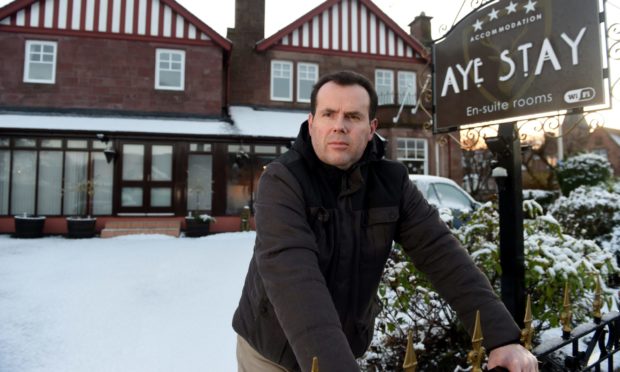Bed and breakfasts will struggle as a result of new short-term let regulations being introduced by the Scottish Government, north members of the industry have said.
It is feared extra costs incurred by the licensing scheme, due to be passed in April, could result in half of private operators leaving the self catering market.
The Association of Scotland’s Self Caterers and Inverness and District B&B Association are campaigning against the proposals, which would see self catering and B&B operators having to apply for a licence from their local authority.
Guest houses would be exempt from the regulations, brought in to curb the high number of Air BnBs leading to a lack of housing supply in problem areas such as Edinburgh.
Each property will require an Energy Performance Certification, which operators say will be costly for older buildings.
David Shayer operates Aye Stay on Bishops Road, Inverness. He is a member of Inverness and District B&B Association.
He said: “The last thing we need coming out of this pandemic is extra costs.
“One member of our association has only two rooms. Smaller businesses are going to struggle with the extra regulations.
“We are anticipating the cost of becoming licensed will be £2,500 – £3,500, with additional cost for installing insulation.
“Our house is 100 years old. It is going to cost a lot to get it up to standard. If you go to stay in a castle you don’t expect it to be fully insulated. If you go to stay in an older property you don’t expect it to be perfect.
“We are not adverse to new regulations, or someone coming round to check the building. But the cost should not be passed onto us.”
The ASSC has written to Fergus Ewing Cabinet Secretary for the Rural Economy and MSP for Inverness and Nairn to oppose the regulations.
In her letter to Mr Ewing, ASSC chief executive Fiona Campbell writes: “No account has been taken of our survey results suggesting that 49% of professional operators
will leave the self-catering market, as licensing will render businesses unviable.”
A Scottish Government spokesman said: “We have consulted extensively, including with the Scottish B&B Association, on proposals to allow local authorities and communities facing severe pressures to take action and level the playing field between B&Bs and properties listed on platforms such as Airbnb.
“Following careful consideration of over 1,000 responses to our recent consultation on the regulation of short-term lets, we laid secondary legislation giving local authorities powers to license short-term lets. If approved by Parliament, the legislation will come into force on April 1 2021. However, existing operators will have until April 1 2023 to apply for a licence.
“Many hosts, including B&B operators, will already be following these standards and this scheme will help to further protect the safety of guests and neighbours across Scotland. We are establishing a working group to develop guidance on the licensing scheme for hosts and local authorities and we will ensure suitable representation on that group from the B&B sector to help us shape the guidance.”
